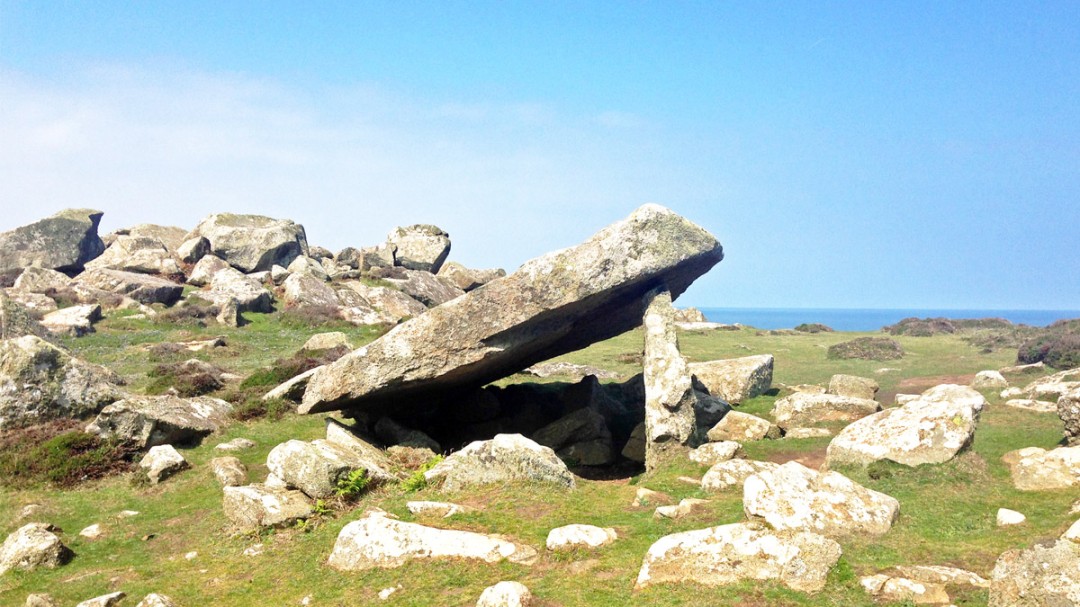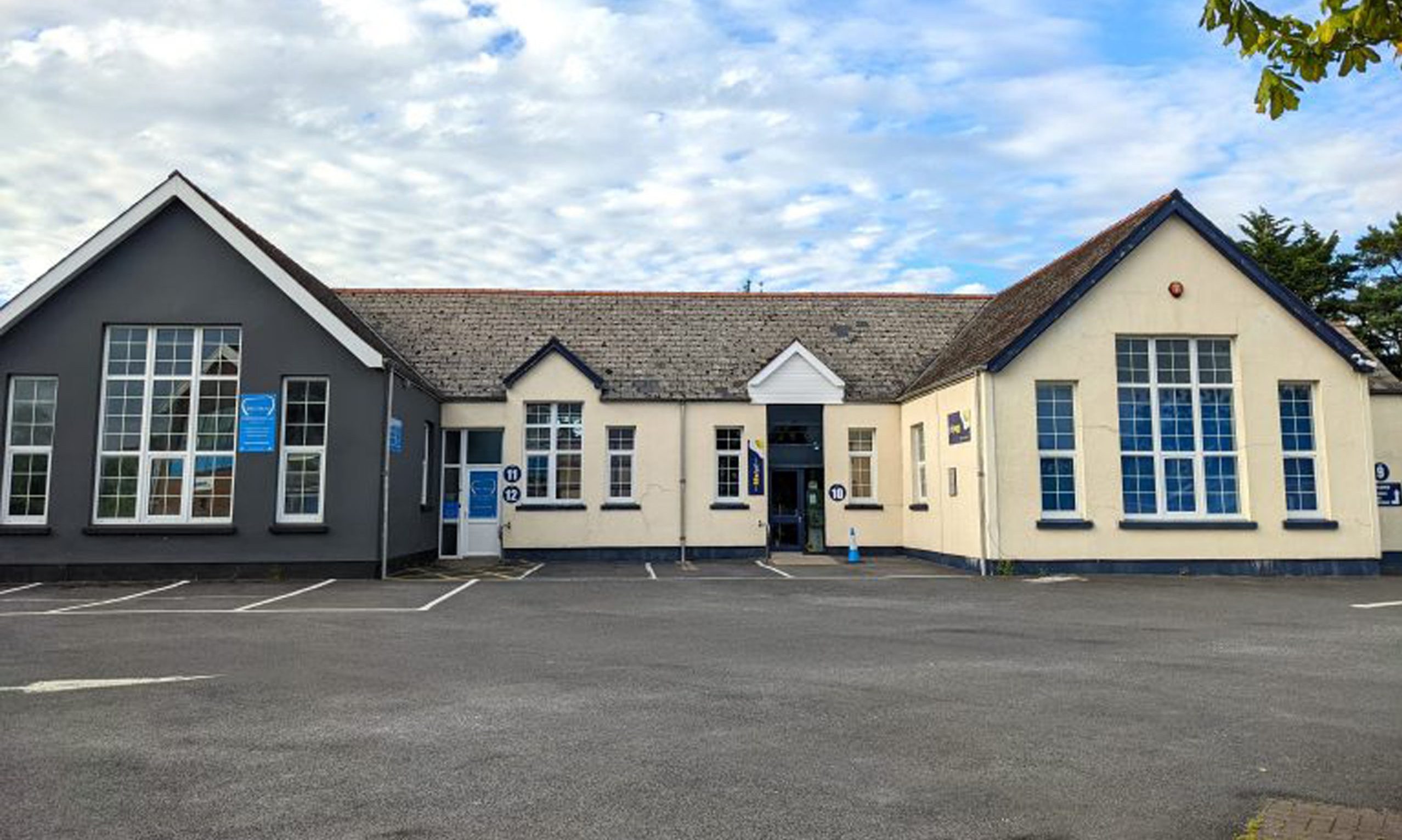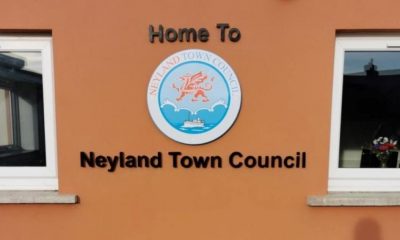News
Council’s cabinet meets

Council Tax to rise by 4.5%

Rattling through the
agenda: Jamie Adams
moved matters quickly on
THE IPPG CABINET nodded through a financial report on Monday, January 5, which contained details of a 4.5% rise in Council
Tax. The proposed rise for 2015/16 would raise Council Tax for a Band D property to £801.44 per year. A meeting of the Cabinet at County Hall on a Monday morning is, perhaps, not the best way to revitalise yourself after a fairly long Christmas break. A heavy agenda loomed, including receiving a report from the Welsh Social Services Inspectorate (CSSIW) on the Council, an interim financial statement setting out the challenges caused by an ever more constrained budget, car parking changes, a new housing finance settlement, and a new location for the County Library. As agendas go, it was weighty: detailed enquiry – particularly on departmental budgets and cuts to them – could have been expected.
Positive steps in Social Care

No comment on cuts
to its budget: Simon
Hancock
First up was a presentation of the type you might reasonably expect any person to like. Significant progress had been made by the
Council in meeting the requirements of CSSIW in relation to social care. Where concerns lingered, they were few, compared to the overwhelming number of positives to be drawn from the presentation by Lesley Stubbs, Area Manager for CSSIW, and the report accompanying it.
Cabinet members Sue Perkins and Simon Hancock, responsible for the portfolios covered by the report, expressed their pleasure with the report and praised staff for achieving a high standard. Ms Stubbs reported that CSSIW had been greatly assisted in the preparation of the report by the stability among the officer cadre and service heads who managed social care and children’s services.
She was hopeful that the current situation, in which key officers – including the former Head of Children’s Services, Jake Morgan – had left the authority would be addressed, so as to ensure progress achieved could be maintained.
Rents rise, but more money for housing

Concerned: Rob Summons
was unhappy with planning
proposals
In the coming year, the Council will revolutionise the way it manages its social housing. To comply with Welsh Government legislation it will begin the process of raising council rents to harmonise with other authorities across Wales. The Council has been forced into this step by the Welsh Government, which has insisted on mandatory rent rises of inflation plus 1.5% for the next four years, plus a further £2.
The Council has cushioned the blow as best it can by reducing the £2 surcharge to £1.50 for the year 2015/16. The change means that Council tenants paying a weekly rent of £70 will be £4 a week worse off from April 6. Tenants in sheltered properties will be required to contribute to sheltered warden costs. Other service charges linked to communal areas in Councilowned properties will follow in April 2016.
While the authority exits the existing financial arrangements with the Welsh Government for social housing, it will have additional monies made available to it as a result. The additional money will be used by the authority to improve its existing housing stock and develop new social housing schemes in the County. The Council’s aim is to deliver initially ten additional properties for social housing a year in each of the next five years, initially by acquiring properties in strategic locations around the County.
No questions about budget cuts
Agenda Item 5 was the medium term financial plan for the next two years. Describing the financial settlements for the current and preceding year as “the two most difficult financial settlements since the Council’s inception in 1996”, the report made grim reading.
Over £2m to be cut off the education budget, just under that amount off adult social care, almost £1m off social care for children, and hefty cuts from already slashed budgets for highways, culture and leisure, and environmental services. A total of over £12m in cuts coming up in 2015/16 and no end in sight for the foreseeable future.
The details behind the headline figures were equally startling: residential care is to be reviewed with a projected saving of £1/4m and a review of commissioned services for adults with a projected saving of over three times that amount. The figures are challenging, to say the least and it is clear that having trimmed low-hanging fruit from the budgetary vine, more serious root and branch surgery is on the way.
The Cabinet, however, possibly stricken by the bleakness of the financial picture, raised not one question on the figures. Nobody offered even a murmur before the topic was closed and the next agenda item addressed.
Concern over planning reforms
The Council gave a frosty response to the Welsh Government’s consultation on a proposed new planning regime. Expressing concerns that the policy did nothing to address the importance of protecting the Welsh language in areas that might be affected by future housing development, Pembrokeshire County Council echoed views expressed both by Carmarthenshire County Council and Cymdeithas yr Iaith Cymraeg.
The Cabinet collectively endorsed the view that so-called ‘front-loading’ of the planning process would produce problems, especially when combined with what was described as ‘an overly-prescriptive’ initial approach to the planning process. The response reflecting those concerns, and prepared by officers was unanimously endorsed.
Cabinet debates Riverside library

Back in three months: Keith Lewis wants fast library decision
By far the longest discussion of the day was devoted to the relocation of the County Library from its current temporary accommodation to new premises. As revealed in last week’s Pembrokeshire Herald, the current Riverside market site has emerged as a strong favourite for the development. While some concerns were expressed about the current stall holders in the market, those were swept aside as a wave of enthusiasm for the site swept around the Cabinet.
The possibility of regenerating Bridge Street by relocating business sited in the market was nodded about with every sign of approval. The fact that those businesses, each of them with leases and some with the benefi t of goodwill and locationrecognition built up over many years, had not been consulted about the grand scheme was rather brushed under the carpet. This was a chance not only to do something but to be seen to do it. The disclosure in the discussion documents that the vacant offi ces at Cherry Grove, acquired only recently by the authority, needed structural work to the floors was all forgotten about.
The thought that they had brought this on themselves by moving the library with NO clear or properly-costed plans for an alternative location, similarly did not engage their notice. ‘Back in three months with a fi rm proposal’, was the call from Councillor Keith Lewis. Having nodded through everything else, his fellow Cabinet members nodded along with that.
Best of the rest
Having managed the rare feat of keeping the platitudes going for almost an hour and a half, the last few items on the agenda were clattered through at a fearful rate. The opportunity given to the Development Directorate to mismanage yet more public money was dealt with on the nod; library opening hours littledetained the Cabinet, save for Neyland councillor Simon Hancock mentioning Neyland library and Pembroke Dock member Sue Perkins doing likewise for Pembroke Dock’s.
A swift trot through car-parking charges, including a brusque disposal of Pembroke Town Council’s objections to charging for coaches on the Commons Road, and the fi nal item on the agenda arrived. Perhaps chastened by the realisation that there had been decidedly little actual debate, there was a marginally more detailed discussion about the Council’s plan to charge a £10 fee for Blue Badge applications.
The fact that Pembrokeshire Council was one of the last hold-outs to charging has done the Council great credit; the fact that they have been compelled to move to charging by legislative changes further up the political food chain is a matter for regret. In a concession, the Cabinet agreed that it would look at ensuring that those on the lowest incomes would not be adversely affected by the charge.
News
New project launched to preserve Pembrokeshire’s hidden place names

Communities invited to share historic names of fields, lanes and landmarks
A NEW project has been launched to uncover and protect historic place names across the Pembrokeshire Coast National Park — from forgotten fields to little-known lanes — before they disappear from living memory.
The initiative, led by the Pembrokeshire Coast National Park Authority in partnership with the Royal Commission on the Ancient and Historical Monuments of Wales (RCAHMW), will gather local knowledge from communities throughout the Park and record it in the national List of Historic Place Names for Wales.
A series of community workshops will take place during 2026, giving residents the opportunity to share names passed down through generations, including those linked to fields, footpaths, buildings and local landmarks.
All information collected will be compiled by Dr James January-McCann, Place Names Officer at the RCAHMW, and formally recorded to help safeguard this cultural heritage for future generations.
Pembrokeshire’s landscape reflects a rich linguistic history shaped by Welsh, English, Nordic and Flemish influences. Organisers say capturing this knowledge now is vital, not only to preserve local identity but also to support landowners, communities and the National Park Authority in future land management and heritage projects.
Tomos Jones, Community Archaeologist at the Park Authority, said: “This is a fantastic project that empowers local communities to come forward with their place names knowledge. The information can then better inform our understanding of the National Park area and help us develop relevant projects.”
Dr James January-McCann added: “Given Pembrokeshire’s rich linguistic history, this is a brilliant opportunity to discover how strong those influences remain today, and to deepen people’s knowledge of their heritage.”
With the National Eisteddfod taking place in Pembrokeshire this year, the project will also use the festival as a platform to reach a wider audience, including a dedicated talk supported by the Eisteddfod team.
Six community workshops are currently scheduled for 2026, with the ambition to expand the programme in future years.
The first workshop will take place at St Davids City Hall on Wednesday (Feb 18), with members of the public invited to drop in at any time between 10:00am and 4:00pm to share information or speak with the project team. Further sessions will be promoted locally and through social media.
Caption: A series of place name workshops will be held to capture the rich linguistic heritage of the local area.
Crime
Pembroke Dock raids: One man in court today as three released on bail

Update follows major Gordon Street operation reported on Friday
ONE man is due to appear in court today (Monday, Feb 16) following last week’s armed police operation in Pembroke Dock, as officers confirmed that three other suspects have been released on bail.
The Herald reported on Friday (Feb 13) that firearms officers, dog units and multiple police vehicles were deployed to Gordon Street during a pre-planned operation involving several specialist departments.
Dyfed-Powys Police has now provided an update on the outcome of the raids.
Two men, aged 37 and 35, and a woman aged 32 — all arrested during Friday’s operation — have been released on bail pending further enquiries.
A fourth suspect, a 28-year-old man arrested for failing to appear in court, has been recalled to prison.
Officers also confirmed that a fifth person was arrested the following day, Saturday (Feb 14).
Zack High, aged 26, has since been charged with grievous bodily harm and is due to appear at Haverfordwest Magistrates’ Court today.
During the initial operation, police said arrests were made for a range of suspected offences including grievous bodily harm, firearms possession, drugs supply, fraud, and possession of a bladed article.
Detective Sergeant Jamie Hughes, of Pembrokeshire CID, previously thanked the community for its patience during the large police deployment and said the action demonstrated that officers would “deal with offenders robustly and efficiently”.
Charity
Sandy Bear charity relocating headquarters as support expands across Wales

Move to Narberth administrative base described as “growth, not closure”
SANDY BEAR Children’s Bereavement Charity has announced it will relocate its administrative headquarters to Narberth in March 2026, as the organisation approaches its ninth year supporting children and young people across Wales.
Founded in Pembrokeshire, Sandy Bear originally supported around fifty children and young people each year. Today, the charity provides bereavement support to more than 1,000 children and young people annually across multiple regions of Wales.
The move from Milford Haven reflects the charity’s continued growth and its commitment to ensuring resources are used as effectively as possible, allowing greater investment in frontline bereavement services.

The new administrative base will be located at The Old School in Narberth, a community hub managed by PLANED, an organisation Sandy Bear already works closely with through its Carmarthenshire provision.
Lee Barnett, Chief Executive of Sandy Bear, said: “Our priority is, and always will be, the children and young people we support. This move is not about changing who we are, but about strengthening how we work. By using our resources more effectively, we can reach more families across Pembrokeshire and across Wales while staying focused on our core mission.”
The charity has confirmed the relocation will not affect service delivery across Pembrokeshire. Sandy Bear will continue meeting families and running peer support groups in community settings throughout the county and across Wales.

Welcoming Sandy Bear to The Old School, Iwan Thomas, Chief Executive of PLANED said: “When third sector organisations work more closely together, communities benefit. Shared spaces allow charities to collaborate more effectively, unlock new funding opportunities and ultimately increase the impact they can have both locally and nationally.”
Sandy Bear says the move represents a positive and sustainable step forward, ensuring the charity remains accessible, resilient and focused on its mission that no child, wherever they live in Wales, should grieve alone.
-

 Health5 days ago
Health5 days agoHealth Board to decide future of nine key services at two-day meeting
-

 Charity7 days ago
Charity7 days agoWelsh patient voices help shape new UK-wide online kidney forum
-

 Business7 days ago
Business7 days agoComputer Solutions Wales under fire from customers
-

 Community6 days ago
Community6 days agoFacebook ‘news’ site targeting Herald editor collapses after community backlash
-

 Community7 days ago
Community7 days agoCalls for traffic calming in Neyland after car hits house
-

 Community8 hours ago
Community8 hours agoHywel Dda hospital services decisions will be made next week
-

 Crime3 days ago
Crime3 days agoFour arrested in armed police operation across Pembroke Dock
-

 Crime7 days ago
Crime7 days agoWoman admits two shop thefts and banned from town supermarkets

























ieuan
January 22, 2015 at 6:33 pm
Once again Joe Public must bear the brunt, why not get rid of all the ”jobs for the boys” to save money?Of course Jamie owes to many favors so we must pay, just like with BJP!
tomos
January 23, 2015 at 9:42 am
Jamie must be earning 2 or 3 times the average Pembrokeshire householders wage PLUS the farm income, Eton educated multi millionaire David Camerons claim of us all being in it together sounds just as hollow when Jamie says it
They are both tories it’s just that IPiG tries to hide that fact.
Flashbang
January 24, 2015 at 9:02 pm
The Special Responsibility Allowances given out are nothing more than bribes to keep the IPG in power. They should be scrapped as councillors are already paid more than enough to be there.
Iestyn
January 25, 2015 at 4:34 pm
So called Independent councillors are usually just a bunch of narcissists who are devoted to the sound of their own voice not real principles. If you stand under a political banner your fortunes are prey to the popularity of your party nationally so it’s safer to pretend to be Independent. Also you can do just whatever you like without reference to stated policies or principles. Personality cults in politics always sell the electorate short.